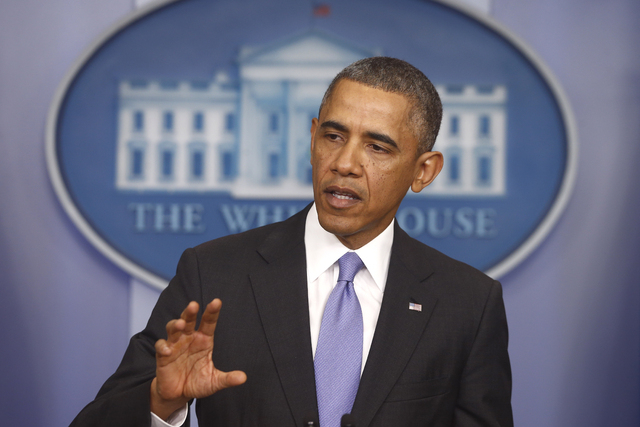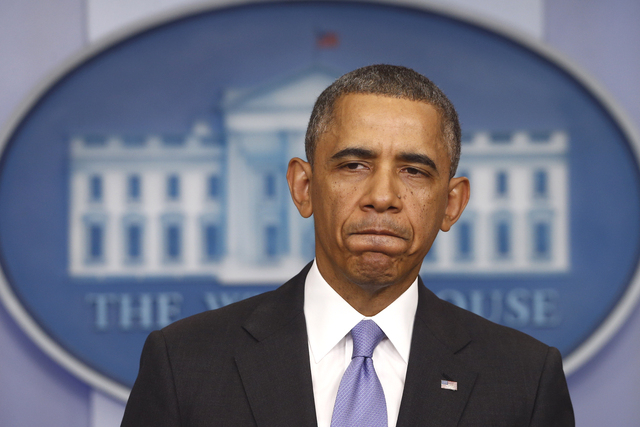Obama to allow sale of canceled health insurance plans




WASHINGTON — His personal and political credibility on the line, President Barack Obama reversed course Thursday and said millions of Americans should be allowed to renew individual coverage plans now ticketed for cancellation under the health care law that is likely to be at the heart of the 2014 elections.
The immediate impact on consumers was unclear, though both industry spokesmen and state insurance commissioners swiftly warned that higher prices could result from the president’s rapid turnaround.
Under pressure from consumers as well as congressional Democrats, Obama said the administration no longer would require insurance companies to jettison current individual and small group plans that fall short of the minimum coverage standards under the law, effectively shifting responsibility for cancellations to the industry itself. The change would be good for just one year, though senior administration officials said it could be extended if problems persist.
Speaking of the millions of people whose coverage is being scrapped, Obama said, “What we want to do is to be able to say to these folks, you know what, the Affordable Care Act is not going to be the reason why insurers have to cancel your plan.”
Obama spoke at a news conference where he repeatedly took responsibility for the woeful rollout of the health care program known by his name. Officials disclosed on Wednesday that fewer than 27,000 enrollments were completed in 36 states in the first month of operations for www.healthcare.gov .
Including enrollment of more than 79,000 in the 14 states with their own websites, the nationwide number was 106,000 for October sign-ups. But that is still far fewer than expected and a mere fraction of the cancellation notices that have gone out because of the law — more than four million according to an Associated Press survey.
Obama’s approval ratings in polls are also ebbing, and he readily conceded that after recent events, the public can legitimately “expect me to have to win back some credibility on this health care law in particular and on a whole range of these issues in general.”
The president also sought to shelter from political fallout any congressional Democrats who echoed the promise he repeated often when the legislation was under consideration in Congress — that anyone who liked his or her coverage would be able to keep it. “They were entirely sincere about it,” he said of the lawmakers. “It’s not on them, it’s on us.”
Shortly after Obama spoke, the major industry trade group, America’s Health Insurance Plans, warned in a statement that prices might rise as a result of his new policy. “Changing the rules after health plans have already met the requirements of the law could destabilize the market and result in higher premiums for consumers,” it said.
A few hours later, the head of the National Association of Insurance Commissioners added a fresh word of caution. Louisiana Insurance Commissioner Jim Donelon, president of the group, said Obama’s proposal could lead to higher premiums and market disruptions next year and beyond.
“In addition, it is unclear how, as a practical matter, the changes proposed today by the president can be put into effect. In many states, cancellation notices have already gone out to policyholders and rates and plans have already been approved for 2014,” he added.
Nor was it clear how different states would react to the administration request to change the rules.
In California, where more than 900,000 cancellations have been sent out, Insurance Commissioner Dave Jones called on insurers to extend the policies being scrapped.
But in Washington, his counterpart, Mike Kreidler, said he won’t allow that to happen. “I have serious concerns about how President Obama’s proposal would be implemented and more significantly, its potential impact on the overall stability of our health insurance market,” he said in a statement.
Until the president made his announcement, the administration had been assuming that individuals currently covered by plans marked for cancellation would switch to alternatives offered in government-established exchanges. If so, they would be joining millions of others who have lacked insurance in the past.
The people with current individual coverage are a known risk to insurers. But those without generally have had less access to medical services, and are most costly to care for. The theory has been that moving people with current coverage into the new markets would help stabilize premiums.
Only last week, Health and Human Services Secretary Kathleen Sebelius told a Senate panel she doubted that retroactively permitting insurers to sell canceled policies after all “can work very well since companies are now in the market with an array of new plans. Many have actually added consumer protections in the last three-and-a-half years.”
It will now be up to individual companies to decide which plans remain for sale, subject to the approval of state insurance commissioners.
Under Obama’s new policy, insurance companies will be required to inform consumers who want to keep canceled plans about the protections that are not included under those plans. Customers will also be notified that new options are available offering more coverage and in some cases, tax credits to cover higher premiums.
Whatever the impact on consumers, Obama’s announcement did nothing to quell Republican opposition to the overhaul they opposed, sought to have overturned at the Supreme Court and have voted numerous times to repeal.
House Speaker John Boehner, R-Ohio, said it was time to scrap the law “once and for all.” He said, “You can’t fix this government-run health care plan called Obamacare. It’s just not fixable.”
Even so, the House is expected to vote as scheduled on Friday on GOP-drafted legislation to permit insurance companies to sell existing individual coverage plans to current customers as well as newcomers. That is a step further than Obama went, and the White House is likely to oppose the measure as a result.
Approval in the GOP-controlled House is expected. Yet Obama’s statement, coupled with an as-yet-undisclosed Democratic alternative, could well hold Democratic defections to a minimum.
Looking forward, Democrats said “Obamacare” will still turn out to be a political winner.
“Voters, particularly in swing districts, would prefer a Democrat who promises to fix and improve the Affordable Care act to a Republican who is obsessed with repealing and gutting it,” said Rep. Steve Israel of New York, who heads the party’s campaign committee.
The president faced a different set of concerns in the Senate, where several incumbents seeking new terms in swing states have been seeking a vote on legislation to require insurers to offer renewals to existing individual plans for 2014 and indefinitely into the future.
The bill’s principal author, Sen. Mary Landrieu of Louisiana, said Obama’s announcement was “a great first step,” yet she added, “We will probably need legislation to make it stick.”
Said Senate Majority leader Harry Reid, “If we need to do more, we will.”
But others were not so eager to put the issue on the floor of the Senate.
Sen. Richard Durbin of Illinois, a member of the leadership, said there was “no need for a legislative fix.” Instead, he said Congress and the administration should continue improving the implementation, and “redouble our efforts highlighting and explaining what this historic law will mean for 40 million Americans without insurance.”
———
Associated Press writers Ricardo Alonso-Zaldivar, Donna Cassata, Alan Fram and Laurie Kellman contributed to this report.












